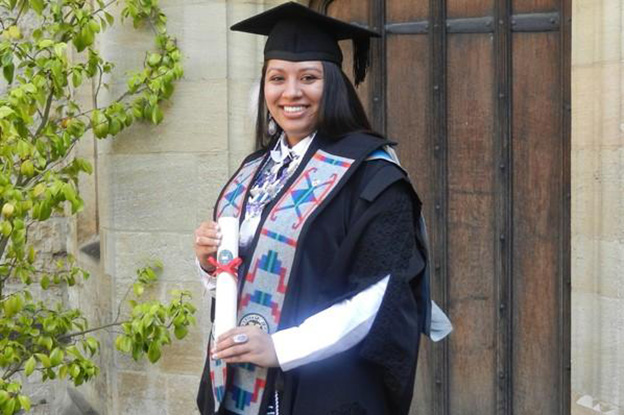Philomathia Trillium Scholar to study climate change’s impact on native communities

McMaster's new Philomathia Trillium Scholar Kelsey Leonard was the first Native American woman to graduate from England's Oxford University. She'll arrive on campus in August.
In many ways, Kelsey Leonard’s life has been defined by water.
A member of the Shinnecock Nation of indigenous people, Leonard grew up on a reserve located on a peninsula on the eastern end of Long Island.
As a child, she remembers how often she was on or near the water, canoeing, fishing or digging for clams.
She also remembers the boil water advisories and the fact that many on the reserve lacked proper plumbing and sanitation.
“Growing up, you adapt, but you sort of realize the disparate nature between what happens on a reserve and what happens in the rest of society,” she says.
It was this experience that sparked Leonard’s academic interest in water policy and management as well as the water-related issues faced by indigenous people.
That interest led Leonard first to Harvard and then to Oxford, where she earned a master’s degree in water science, policy and management and became the institution’s first female Native American grad. She has also earned a degree in law.
This summer, with the support of a Philomathia Trillium Scholarship, she’ll come to McMaster to join the growing group of researchers – from all sorts of academic disciplines – studying water here.
“It was a no-brainer,” she says of choosing McMaster. “If we’re going to make innovative changes for water resource management, it has to come from an interdisciplinary approach. We can’t solve these issues in isolation. So I’m thrilled to be at McMaster.”
Leonard cited the McMaster Water Network, Indigenous Studies Program and United Nations University Water Without Borders program as innovative examples of interdisciplinary research and education.
One of the topics Leonard will tackle while at McMaster is climate change adaptation in First Nations communities.
“Extreme events like floods cause storm surges that overload nutrients into bodies of water – how do indigenous communities manage events like this? How do these communities maintain economically viable natural resources? These are the sorts of questions I want to ask,” she says.
Dustin Garrick, the Philomathia Foundation Professor in Water Policy and Research and Leonard’s supervisor, says Leonard will find a strong community of more than fifty faculty members and hundreds of students doing water research at McMaster.
“The McMaster Water Network was created to support students like Kelsey who want to deepen their understanding of the drivers of the global water crisis,” he says. “She represents a new kind of scholar, who blends knowledge and action to make a difference for indigenous communities affected by climate change and water crises. We are extremely fortunate to have Kelsey join McMaster and contribute to its traditions of discovery, problem-based learning and engagement with community.”
Leonard will arrive at the University in August.


